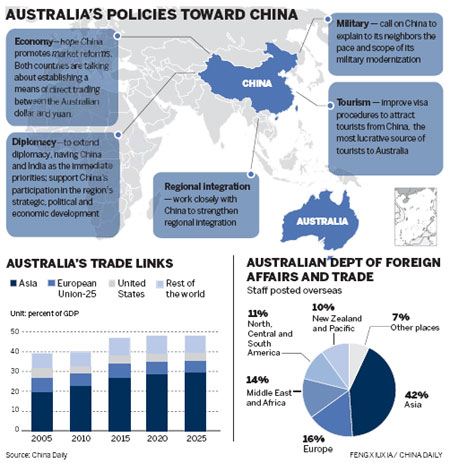
White paper outlines 25 objectives for nation to achieve by 2025
Australia on Sunday released an Asia "pivot" white paper calling for deeper engagement with the region that is witnessing a "staggering" rise, while China is apparently at the center of almost every facet of the policy.
The long-delayed white paper Australia in the Asian Century, commissioned by the Prime Minister Julia Gillard, outlines 25 objectives for the nation to achieve by 2025 through exploiting the opportunities of Asia's development by becoming a more Asia-literate country.
"In this century, the region in which we live will become home to most of the world's middle class and will be the world's largest producer of goods and services, and the largest consumer of them," Gillard said.

"China's importance to Australia, economically and politically, will only grow in decades to come," said the white paper. "We want, therefore, to deepen our already close and cooperative relationship with China at every level."
The Australia China Business Council, Australia's leading organization committed to China engagement, described the paper as a "wake-up call to both Australian political and business sectors that need to lift our game if the Asian Century is to amount to anything more than rhetoric", Xinhua reported.
Analysts said China's motor for Australia's economic evolution during the global recession is the top reason behind Canberra's largest effort yet to articulate the link between the two countries.
As Australia's economic ties with China deepened, the correlation between the quarterly motion in Australian and Chinese GDP increased steadily in the lead-up to the 2008 global financial crisis, the report said.
China, its leading trading partner and the first customer when it comes to marketing Australia's massive natural resources, can contribute to one of the targets set by the paper - lifting Australian GDP per capita to be among the top 10 in the world, which means bringing it from around $62,000 per capita last year, 13th in the world, to at least $73,000 per capita by 2025, analysts said.
Yang Baoyun, an expert on Asia-Pacific studies at Peking University, said China's emerging power may change the regional and global order one day, so Canberra also aims to know more about China's strategy through intensified exchanges in the economy, diplomacy and culture.
According to the report, Australia will extend its diplomatic architecture and strength defense cooperation with China, support Beijing's participation in the region's strategic, political and economic development, and revise its immigration and visa rules to draw more Chinese tourists and highly-skilled workers.
The report recommended setting up an Australian consulate in Shenyang, Liaoning province.
Zhang Yuanyuan, former Chinese ambassador to New Zealand, said Australia has been in a dilemma over the Asia "pivot" issue for decades because it is geographically near Asia but psychologically closer to the West.
To address the gap in mutual understanding, the report places great emphasis on students' learning Asian languages such as Chinese, Hindi, Indonesian and Japanese, saying Asian studies "will be a core part of a national school curriculum".
When making a step forward in Australian-Asian relations, Canberra also reconfirmed its strong alliance with the United States, which has recently been accelerating its Asia-Pacific strategic shift.
Washington's effort to beef up its military presence with allies including Australia has caused concern in China. In April, the first contingent of 200 US Marines arrived in Darwin as a part of a 2,500-strong deployment of troops in northern Australia by 2017.
Although the Chinese-US relationship "will inevitably have a competitive element", Australia is "optimistic about the ability of China and the US to manage strategic change in the region", said the white paper, adding that a containment policy will not work or be in the interests of any party.
Canberra can hardly become a coordinator between Beijing and Washington because of its limited influence on international affairs, said Peking University's Yang. "What it wants from the triangle relation is to benefit from Sino-US competition and boost its role in Asia through its ally's backup."
But Washington's attitude toward Canberra's call and the effect of its new Asian strategy remain to be seen if some parts of the paper can be implemented, he added.
Deng Zhangyu contributed to this story.
zhaoshengnan@chinadaily.com.cn







